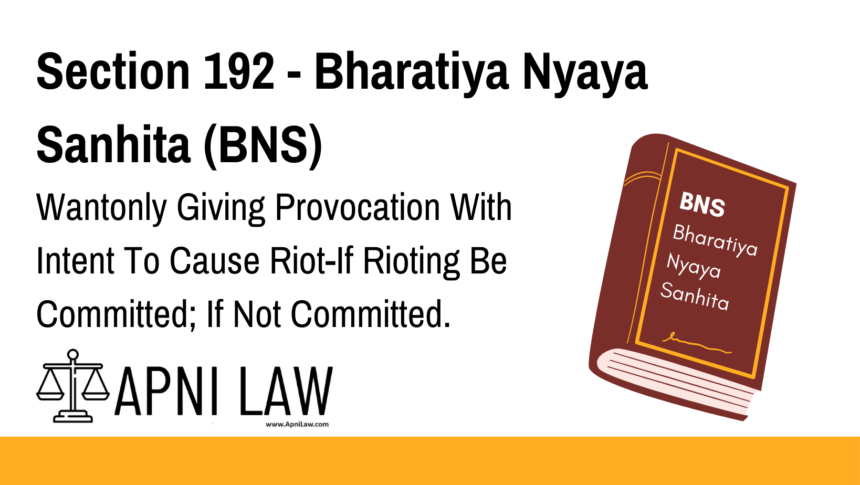Code: Section 192 BNS
Whoever malignantly, or wantonly by doing anything which is illegal, gives
provocation to any person intending or knowing it to be likely that such provocation will
cause the offence of rioting to be committed, shall, if the offence of rioting be committed in
consequence of such provocation, be punished with imprisonment of either description for
a term which may extend to one year, or with fine, or with both; and if the offence of rioting
be not committed, with imprisonment of either description for a term which may extend to six
months, or with fine, or with both.
Explanation of Section 192 BNS
Section 192 of the Bharatiya Nyaya Sanhita (BNS), 2023, addresses situations where a person intentionally provokes others in a way that could lead to rioting. The law differentiates punishment based on whether or not rioting actually occurs as a result of such provocation.
Key Elements of Section 192 BNS
- Illegal Provocation – The act must be malignant or wanton and illegal.
- Intent or Knowledge – The offender must know or intend that the provocation is likely to cause rioting.
- If Rioting Happens – If the provocation leads to actual rioting, the punishment is up to one year of imprisonment.
- If Rioting Does Not Happen – Even if rioting does not occur, the mere act of provoking violence is punishable with six months of imprisonment.
Illustration
Example 1: Provocation Leading to Rioting
A political leader delivers an inflammatory speech targeting a rival community, urging people to attack. If a riot breaks out as a result, the leader may be charged under Section 192 BNS, with imprisonment of up to one year.
Example 2: Provocation Without Rioting
A social media influencer posts fake news to instigate violence between two groups, but the police intervene in time, preventing a riot. Since no rioting occurred, the influencer can be punished with six months of imprisonment under Section 192 BNS.
Common Questions and Answers on Section 192 BNS
1. What is the difference between Section 191 BNS and Section 192 BNS?
- Answer:
- Section 191 BNS deals with rioting itself, where an unlawful assembly uses force or violence.
- Section 192 BNS punishes those who provoke others into rioting, whether rioting occurs or not.
2. Can a person be punished under Section 192 BNS if their provocation was unintentional?
- Answer: No. The law requires that the person must intend or know that their provocation is likely to cause rioting.
3. What is the maximum punishment under Section 192 BNS?
- Answer:
- If rioting occurs, up to one year of imprisonment.
- If rioting does not occur, up to six months of imprisonment.
4. Is Section 192 BNS a bailable offence?
- Answer: Yes, offences under Section 192 BNS are bailable, as the maximum punishment does not exceed three years.
5. Can Section 192 BNS be used against hate speech?
- Answer: Yes, if the hate speech is illegal and intended to incite violence, it can be punishable under Section 192 BNS.
Conclusion
Section 192 BNS is a preventive legal provision aimed at stopping riots before they occur. It holds individuals accountable for provocative actions, ensuring public order and peace.
For expert legal insights, visit ApniLaw today!










